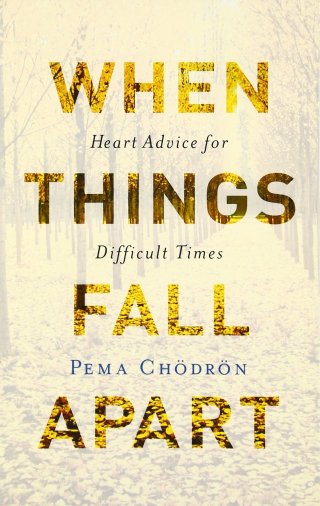Overview
So often we are encouraged to believe that if we feel poorly, or our life seems to be falling apart, something is wrong. We are told that we need to change ourselves and change the situation. But what happens when we turn this advice on its head? What happens when we are confronted by the ground being taken from beneath us, and we see this as a splendid opportunity? What happens when we use groundlessness, heartbreak, and uncertainty as the very pillars upon which we learn to find solace, comfort, and growth?
When Things Fall Apart - Heart Advice for Difficult Times teaches us just that. Using mindfulness and meditation to cultivate awareness for all states of being, Pema Chödrön teaches us that our very desire to escape suffering is what keeps us endlessly confronting it. Using Buddhist teachings as a foundation, we learn that these moments of terrifying discomfort are actually the most important parts of our life. We can learn to sit with ourselves in the hot seat, or run from it and find ourselves there over and over again.
Understanding that the difficult moments in life are the greatest teachers, we are taught to bear with the trying times.
Using meditation is the key element to successfully remaining present through even the most gut-wrenching moments of our lives. Pema encourages us that after years and years of practice and sticking with it, these once horrid moments transform into beautiful opportunities. Swords become flowers.
Cultivating awareness and the ability to soften up to a situation shows us when we normally shut down and close off our hearts. There are many techniques and ideas that this extraordinary read covers, all of which take our normal way of thinking and turns them inside-out, much as we must do with ourselves in order to find our deepest compassion, joy, and awe. The simplest things in life become the most sacred. Our willingness to be present through storms and summer delights alike lead us on the path of the peaceful warrior, one of unconditional love, empathy, and non-harm.
Most interestingly, instead of climbing a mountain up into the heavens where we find ourselves in blissful isolation, we are encouraged to descend the inverted mountain into the depths of hell. Here, we find compassion for all beings, situations, and pain. We can empathize with the most difficult of our own emotions, as well as those of others.
Only after remaining present to the fullness of our experience, the totality of our emotions, will we slowly start escaping the cycles that perpetuate our suffering.
But to do so, we must let go of the control which we so desperately seek. We must be willing to sit. To suffer. To let things fall apart so that we may find greater wisdom, compassion, joy, and contentment in our hearts than we ever imagined possible.
Memorable Quotes
“We think that the point is to pass the test or overcome the problem, but the truth is that things don't really get solved. They come together and they fall apart. Then they come together again and fall apart again. It's just like that. The healing comes from letting there be room for all of this to happen: room for grief, for relief, for misery, for joy.”
“As human beings, not only do we seek resolution, but we also feel that we deserve resolution. However, not only do we not deserve resolution, we suffer from resolution. We don't deserve resolution; we deserve something better than that. We deserve our birthright, which is the middle way, an open state of mind that can relax with paradox and ambiguity.”
“We don't set out to save the world; we set out to wonder how other people are doing and to reflect on how our actions affect other people's hearts.”
“The most fundamental aggression to ourselves, the most fundamental harm we can do to ourselves, is to remain ignorant by not having the courage and the respect to look at ourselves honestly and gently.”
“When we protect ourselves so we won't feel pain, that protection becomes like armor, like armor that imprisons the softness of the heart.”
“Once there was a young warrior. Her teacher told her that she had to do battle with fear. She didn’t want to do that. It seemed too aggressive; it was scary; it seemed unfriendly. But the teacher said she had to do it and gave her the instructions for the battle. The day arrived. The student warrior stood on one side, and fear stood on the other. The warrior was feeling very small, and fear was looking big and wrathful. They both had their weapons. The young warrior roused herself and went toward fear, prostrated three times, and asked, "May I have permission to go into battle with you?" Fear said, "Thank you for showing me so much respect that you ask permission." Then the young warrior said, "How can I defeat you?" Fear replied, "My weapons are that I talk fast, and I get very close to your face. Then you get completely unnerved, and you do whatever I say. If you don’t do what I tell you, I have no power. You can listen to me, and you can have respect for me. You can even be convinced by me. But if you don’t do what I say, I have no power." In that way, the student warrior learned how to defeat fear.”
Strengths
An absolutely essential read for all spiritual warriors.
Learning to let our suffering become a valuable and cherished aspect of our existence can lead us to greater joy and unconditional love.
This book is an excellent overview of many quintessential Buddhist teachings.
Further Discussion
When Things Fall Apart focuses primarily on various forms of meditation as the sole technique for the teachings. Additionally, some concepts may come off as Buddhist fundamentalism, to some degree. Keep an open mind as you explore a way of thinking that is completely contrary to so much that we are used to.
The Bottom Line
Read this book. Multiple times. Truly. Let the wisdom of many centuries of teachers come alive in your mind and heart with this essential treasure. Learning how our desire to escape pain and suffering can create cycles of the same sheds a tender and freeing light upon our life and soul. This is the bible of surrendering to the moment. The language of love starts by unconditionally accepting ourselves. And for that, we must learn the value of patience and presence. When Things Fall Apart gives us the tools to keep on the path of the dharma, even when we fall off.


